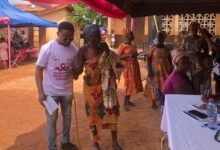
A five-year training programme aimed at building the innovative and entrepreneurial capacities of 10,000 young people in mining communities across the country has been launched in Accra.
Dubbed, Entrepreneurship Jobs for All Programme and christened “E-Jobs4All,” it is one of the modules under the National Alternative Employment and Livelihood Programme (NAELP) being implemented by the Ministry of Lands and Natural Resources.

It is being implemented in partnership with the Queens University, Leadogo Incorporated Canada, and the Centre for Entrepreneurship and Development Initiative (CEDI Ghana).
The training, which will focus on apprenticeship, skills training and entrepreneurship, was launched by the Minister of Land and Natural Resources, Samuel A. Jinapor, yesterday.
Speaking at the event, Mr Jinapor said, the programme formed part of government’s initiative to provide decent jobs for the youth who either reside or hail from the mining regions of the country.
Aimed primarily at tackling unemployment, he stated that, it was an initiative to empower the youth, foster innovation, and unleash the potential that lies within mining communities across the country.
He noted that, the programme was designed to equip the beneficiaries with tools, skills, and insights necessary to carve, shape, and transform ideas into profitable ventures.
“Through this programme, we do not only seek to impart knowledge, but cultivate a mindset of innovation and entrepreneurship in our people. We recognise that true empowerment rests, not only in creating employment but instilling the ethos of self-reliance and enterprise.
That is why the programme has been designed to build entrepreneurs who can navigate the complexities of business, and become job creators,” Mr Jinapor stated.
Despite the contribution of mining to the national economy, he said, the historical underdevelopment of mining communities remained a challenge.
In this regard, he noted that, through the Minerals Development Fund, and the other alternative livelihood programmes being implemented by the Minerals Commission, the government had rolled out various initiatives to support the development of the communities with revenue accruing from mining.
Additionally, the Minister said, the government was engaging mining companies to ensure that they contribute, meaningfully, to the development of their host communities.
“That is why, under the mining lease granted for the exploitation of some of our lithium resources, we have, in addition to the increases in royalties’ rate and state participation, negotiated for the payment of a one per cent of the company’s revenue into a Community Development Fund, to be utilised for the development of communities to be affected by the mining operations,” he stated.
To curb the illegalities in the small scale mining sector, Mr Jinapor said, the government declared water bodies as Red Zones, placed a ban on reconnaissance, prospecting and/or exploration in forest reserves, procured speed boats to patrol rivers, and launched Operation Halt II, among others.
The Coordinator of NAELP, Dr Louise Carol Serwaa Donkor, said the project was aimed at promoting sustainable and resilient business within mining communities by fostering the growth of existing businesses.
She noted that, E-Jobs4All would create an environment that could absorb the talents and ambitions of the unemployed youth to contribute to the development of their regions.
Dr Donkor stated that, only Ghanaian youth were eligible to apply for the programme, adding that the beneficiary should be an aspiring entrepreneur.
She noted that, the trainees, after completion, would be given a certificate of specialisation in entrepreneurship and innovation and a micro credential from Queen’s University in Canada.
Application for the course is stipulated for November 28 and ends on December 17 this year while course training would commence in February next year.
Mr Kingsley Kwaku Pinkrah, the founder and CEO of CEDI Ghana, emphasized that the initiative would establish avenues for sustainable livelihoods, foster innovation, and empower individuals to build businesses that positively contribute to their communities and the country’s economy.
BY CECILIA LAGBA YADA








